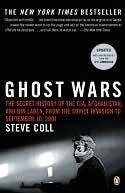By refusing to declare the Taliban an enemy Clinton and his Cabinet made Tarnak a very complicated target. In another sense, however, the farm was a symbol of the political-military problem now commonly referred to in Washington as “asymmetric warfare,” which described the advantages that terrorists and guerrillas can exploit against a superpower by virtue of being small, dispersed, and blended with civilian populations.
Welcome back. Just a moment while we sign you in to your Goodreads account.


